Halifax-area schools set to hire replacement workers during strike
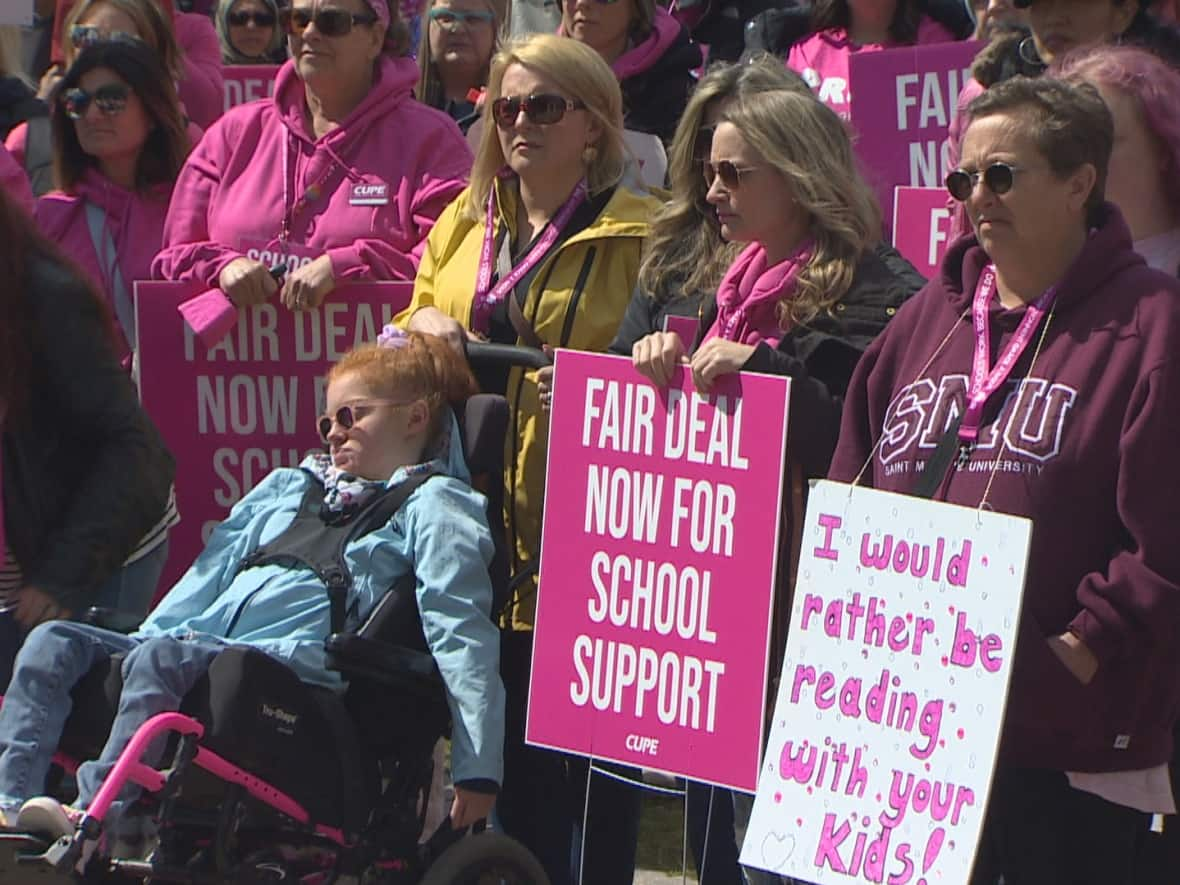
As a strike by school support workers enters its second week, the Halifax Regional Centre for Education is attempting to hire replacement workers and is inviting some parents to attend school with their children.
The HRCE confirmed Wednesday it is recruiting replacements for striking employees.
"HRCE has communicated with casual employees this week to ensure they were aware that they could continue to work in schools during the job action," reads a statement to CBC News from spokesperson Lindsey Bunin.
"We are also exploring different options to increase the number of people available to work in schools, including the hiring of temporary replacement workers."
Bunin said the centre has contacted seven local recruitment agencies, and is using MaxSys to help find workers. She would not say how much they are paying the company for its services.
No temporary workers have been hired as of mid-day Thursday, Bunin said, but about 20 casual employees are filling in.
More than 1,800 members of the Canadian Union of Public Employees Local 5047 have been on strike since May 10.
Wages are the primary issue in the dispute, with the union asking for a four-year contract that includes a raise higher than what the HRCE was offering — 6.5 per cent over three years. The union has not publicly shared its wage request.
The employees include early childhood educators, educational program assistants, assistive technology support workers, child and youth care practitioners, Mi'kmaw and Indigenous student support workers, African Nova Scotian school support workers, SchoolsPlus community outreach workers and school library specialists.
Parents invited into classrooms
Kevin Cunningham received a phone call from the principal of his son Lian's school on Wednesday inviting him or his wife to join Lian at school.
A Grade 3 student at John W. MacLeod, Lian has cerebral palsy, autism, a seizure disorder and is mostly non-verbal. He is one of two students at the elementary school who was told he had to stay home during the strike, Cunningham told the CBC's Information Morning Halifax.
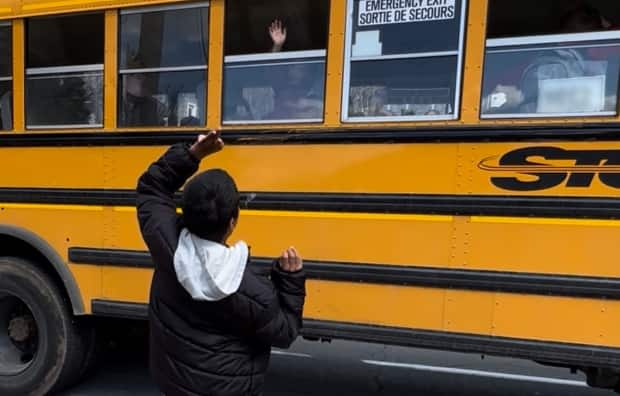
Cunningham said he was told initially Lian had to stay home for safety reasons, and when he asked if he could go with his son to mitigate those risks, he was told parents weren't permitted.
"We asked why. And of course that was, you know, 'Nobody can do an EPA's job while the EPA's on strike.' And we said, 'Well, is this a safety thing then, or is this a labour law issue?' So they really couldn't answer that."
'Schools are not OK'
Nova Scotia Teachers Union president Ryan Lutes says the fact that the HRCE is scrambling to find supports for students with special needs underscores the importance of EPAs.
"If parents are being allowed in schools, if the employer is going to all these kind of stopgap measures to support kids, that shows how critical these workers are," he told Information Morning Halifax.
But Lutes says temporary replacement workers won't adequately fill the gap left by striking workers.
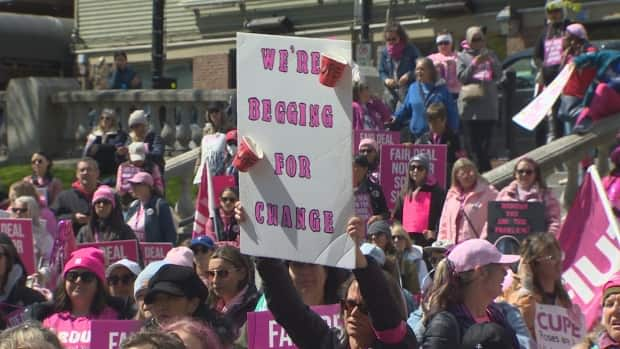
"All those folks are trained to be there. They have deep relationships with the students they support and with the teachers they help to support. So thinking that you can hire a replacement worker and get them up to speed to support students is just, it's crazy."
Schools are struggling to cope with staffing since the strike began, Lutes says.
"Teachers are being run amok. They're just trying to fill in gaps. Administrators are trying to fill in gaps. Schools are not OK."
Human rights complaints
Cunningham says he plans to pursue a complaint with the Nova Scotia Human Rights Commission on the basis that his son's right to education is being denied.
"We use the words discrimination because that's what we think it is," he says. "We've seen 600 kids with disabilities singled out and basically told that they're not allowed to go to school."
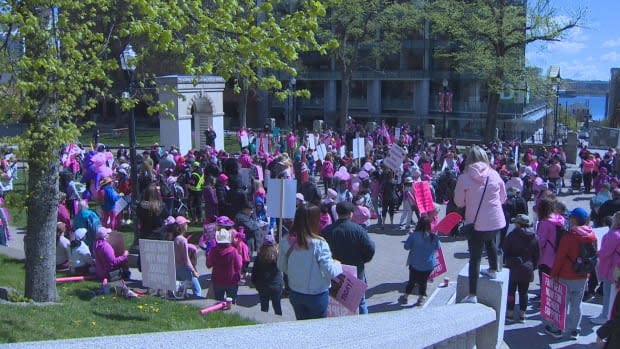
Meanwhile, a news release from the Nova Scotia Liberals Caucus on Thursday says Leader Zach Churchill is asking the Nova Scotia Human Rights Commission to investigate the situation as a case of discrimination.
"This discrimination is a direct result of the province abdicating its legislated responsibility to treat all students in the provincial school system equally," Churchill's letter to the commission reads.
"To leave out these students based on their abilities or age is discriminatory. Their right to be in school alongside all other students should have been accommodated equally."
Premier speaks with pickets
Premier Tim Houston spoke with some striking workers on a picket line outside Ecole des Beaux-Marais, including one woman who told him she makes $731 every two weeks as an early childhood educator, and could make more money working at Costco.
Houston interrupted the woman to ask what her union was telling members about negotiations.
"That we need to go back to the table.… And you have that power, sir."

"I hope there's discussions that resolve the impasse," Houston told her, adding that he believes in the collective bargaining process.
"In this case here, the CUPE leadership came to the table. They had three asks. We negotiated with them on those three asks. We reached what they were looking for.… We can only go by what the leadership brings to the table as their wants. So I would encourage you to go back to your union leadership and ask them how they maybe got it wrong."
In bargaining, one of the union's requests was wage parity across the regions. But when it came down to ratifying the tentative agreement, workers in the Halifax area rejected it, saying the wage offering was not acceptable to them.
Education Minister Becky Druhan told reporters the ball is now in the union's court.
"It's really at this stage up to CUPE to work with their HRCE members to find a solution to this situation," Druhan said.
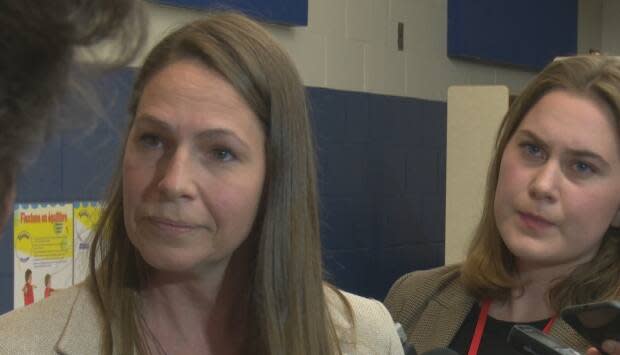
CUPE 5047 president Chris Melanson said the union's negotiating team is ready to return to the bargaining table anytime.
"We're standing outside the buildings willing to talk, willing to get back to work for a better wage."
Melanson said the union is concerned about HRCE's plans to hire replacement workers who may not be trained or qualified to do the jobs. He added that it's "a little bit of disrespect" that the employer is willing to pay for temporary workers, but not its own staff.
As for bringing parents into the classroom, Melanson said as caring and knowledgeable as parents are, they are not trained to do the work the support staff do, and that during at-home learning early in the COVID-19 pandemic, acting as both parent and teacher "strained the relationship between parent and child."
Rally at Grand Parade
A large rally in Halifax's Grand Parade attracted hundreds of school support workers and their supporters on Thursday.
Heather Langley, who helped organize the rally, attended with her daughter Lucy, who is in Grade 5 at Burton Ettinger Elementary in Halifax and requires one-on-one care. Since the strike began, Langley has taken sick leave from her job in order to be home with Lucy.
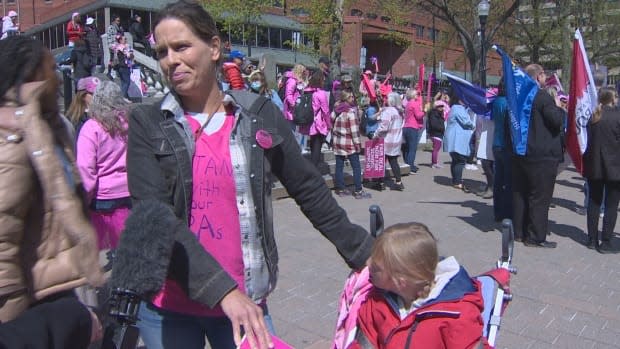
School is Lucy's "happy place" and the help she received from school support workers has enabled her to thrive, Langley says, including walking semi-independently.
"While you support our children every day, today we are here to support you," she told CUPE members at the rally.
MORE TOP STORIES


